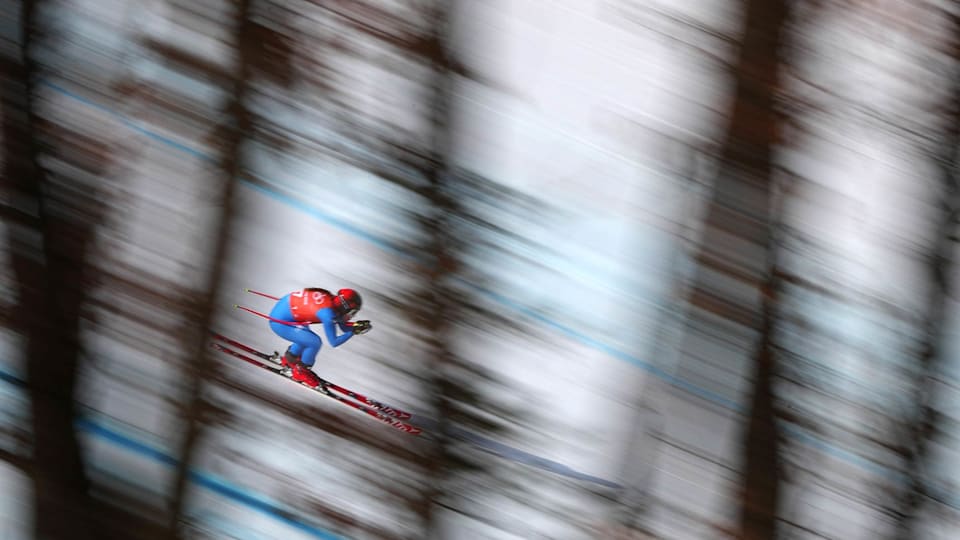Alpine skiers serve up historic feats as Ledecká wins shock gold
In the Alpine skiing speed events at PyeongChang 2018 Norway’s Aksel Lund Svindal won his country’s first ever Olympic downhill title and Italy’s Sofia Goggia claimed a maiden women’s downhill crown for her nation, while Ester Ledecká of the Czech Republic caused a sensation by storming to women’s super-G gold and Austria’s Mathias Mayer outstripped his Norwegian rivals to prevail in the men’s super-G.

Men’s downhill: age no impediment for Svindal
The men’s downhill at the Jeongseon Alpine Centre saw Switzerland’s Beat Feuz, the reigning world champion, stake an early claim for gold with a classy run and a time of 1.40.53. The Swiss would not hold the lead for long, however, as determined veteran Svindal shaved 0.18 seconds off Feuz’s time to become Norway’s first Olympic downhill champion and the oldest Alpine skiing gold medallist at 35 years old.
Starting ninth, fellow Norwegian Kjetil Jansrud led at every split before making a mistake in the closing stages, losing him valuable time. He finished 0.12 seconds outside his compatriot’s time but just inside Feuz’s to secure a Norwegian one-two.
A super-G gold medallist at Vancouver 2010, Svindal left Sochi 2014 empty-handed but in PyeongChang he bounced back from a knee injury sustained in January 2016 to claim his second Olympic title. Understandably delighted with his gold, the Norwegian was also thrilled to have his friend Jansrud alongside him on the podium.
“I could see how fast he was and I was preparing myself for silver,” said Svindal. “I thought he was quicker than me for the most part… It’s a very special day for sure.”
Men’s super-G: no stopping Mayer
The Norwegian contingent were expected to perform well again in the following day’s super-G, but it was Austria’s Mayer who took the honours, topping the podium ahead of Feuz and Jansrud.
A surprise downhill champion at Sochi 2014 and a faller in the slalom leg of the Alpine combined at PyeongChang 2018, Mayer excelled in the Jeongseon sunshine, his textbook technique allowing him to post the fastest time of one minute, 24.44 seconds. “When I took the first jump I knew I was having a good run. That’s why I pushed it on the last two gates and I couldn’t believe it when I saw the green on the leaderboard.”
Jansrud’s bronze was the fifth medal of his career, putting him level with Italy’s Alberto Tomba and compatriot Lasse Kjus as the most decorated male Olympian in Alpine skiing.
Women’s super-G: Ledecká comes out of nowhere
Better known for her snowboarding skills, Ledecká defied her modest Alpine skiing career record and a start position of 26 to spring the surprise of PyeongChang 2018. Having never finished higher than 19th in a World Cup race, the 22-year-old Czech produced a sensational run to snatch the gold by the smallest of margins from defending champion Anna Veith of Austria. The bronze went to Liechtenstein’s Tina Weirather, the reigning World Cup champion in the event.
The only athlete competing in both snowboard and Alpine skiing at PyeongChang 2018 and the dominant force in her favoured parallel giant slalom and parallel slalom events, Ledecká owed her shock gold to her searing speed, which allowed her to make up for a late mistake and cross the line a mere hundredth of a second ahead of Veith, much to the Czech skier’s disbelief.
“I wondered what was going on. I thought there was a mistake,” she said afterwards. “I thought they were going to change my time…I looked at the leaderboard and nothing happened. Everyone was shouting and I said to myself: ‘OK, this is strange’.”
Women’s downhill: Goggia makes history
The last of the Alpine skiing speed events at PyeongChang 2018, the women’s downhill had been tipped to be a duel between the USA’s Lindsey Vonn and Sofia Goggia of Italy. That script almost played out on the day, with the Bergamo skier beating the Vancouver 2010 champion by nearly half a second to become the first Italian ever to win the event. The surprise came when Norway’s Ragnhild Mowinckel split the two favourites by finishing less than a tenth of a second behind Goggia to claim an unexpected silver and leave Vonn with the bronze, her third Olympic medal.
“I couldn’t have done it any better,” said Goggia, who had also won the test event a year earlier.
Not at her attacking best, Vonn was behind the Italian at every split and saw second spot slip from her grasp when Mowinckel was rewarded for her bold approach as she claimed her second silver of the Games to go with the one she won in the giant slalom.
